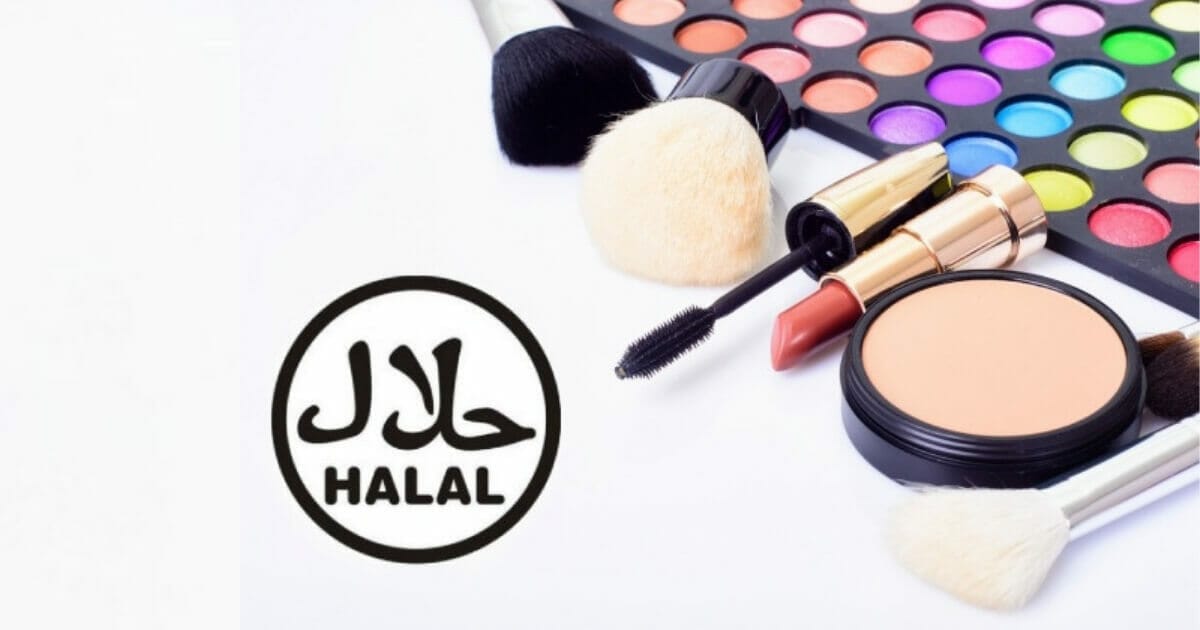Muslim women take good care of their body and makeup. Hair is particularly treated, because it is contained in veils and is subject to loss.
Remember Muslim women’s eyes are the focal point of charm. So for them it is very important that these products are permeable.
Permeable products let water pass during ablutions, which is the washing procedure before prayer. Keeping her appearance, according to Islamic Sharia, means getting closer to God.
Halal Cosmetics
Let’s begin by explaining what Halal is.
Halal comes from an Arabic word that means permitted or acceptable according to Islamic law.
Halal cosmetics are products that only use animal ingredients from animals that have been Islamically slaughtered. This of course excludes pigs that are completely forbidden, and additionally, the process must be cruelty-free.
Although Halal cosmetics are specifically for Islamic women, more and more people are using them because they want to wear makeup safely and reduce harm to their skin.
Until recently, Halal was only associated with food. But today, the word Halal is also seen in financial and beauty products.
Today, Muslims constitute 20% of the world population. Islam lives differently in various areas of the world, but Muslims share the concept of Sharia, which is a guide for religious, political, social, private and domestic life.
So how do you know if the cosmetic manufacturer is Halal Certified?
A product is Halal Certified after the Islamic authority checks the cosmetic manufacturer facilities to make sure there is no ‘haram products’ or alcohol. This also includes fluids used to clean the equipment involved in the manufacturing process.
To be certified halal, a business must be able to bring to light the source of every ingredient of the cosmetic to make sure that it was created according to Sharia Law. In addition, every cosmetic product is tested individually to ensure there are no pork or animal product traces.
The Halal certification is issued for a cosmetic product if all requirements are met.
The market for Halal Cosmetics is expected to rise by 15% in the next five years. So it is very important for OEM cosmetic manufacturers to take a look at this increasing market.
By developing Halal certified cosmetics, OEM cosmetic manufacturers are introducing a new external and internal operation that will serve the growing customer needs. Halal, which gives an impression as simple as no pork, alcohol or animal products, in fact has a higher standard than these.
What is Allowed
Cosmetic manufacturers that are certified Halal can only use substances coming from herbivorous animals, except for donkeys. From donkeys, it is possible to use their meat but not their blood. All animals must be slaughtered according to Islamic Sharia.
There is an entire procedure that needs to be followed when it comes to slaughtering animals. The process entails killing the animal in the most humane way possible.
What is Forbidden
Cosmetics OEM products that are Halal certified do not contain parts of pig or donkey and their derivatives. It cannot contain parts such as bones, claws, hair and fats commonly used to manufacture cosmetics.
Another highly risky ingredient in Halal cosmetic manufacturing is Alcohol. In fact, some cosmetic manufacturers have created alcohol-free perfumes and creams dedicated to Muslim consumers.
The extraction of substances from living animals that are suffering is also forbidden.
Other ingredients that are not permitted in Halal cosmetics:
- Albumen: usually derived from egg whites
- Allantoin: may be derived by uric acid from cows
- Amino acids: Obtained from whale intestines
- Arachidonic Acid: Generally isolated from animal liver
- Cholesterol: A steroid alcohol in all animal fats and oils
- Collagen: Usually derived from animal tissue
- Hyaluronic Acid: A protein found in umbilical cords
- Keratin: Protein from the ground-up horns, hooves, feathers, quills, and hair of various animals
- Stearyl Alcohol: A mixture of solid alcohols
- Vitamin A: Can come from fish liver oil
Keep in mind that Halal cosmetics doesn’t mean it’s vegan. It is therefore crucial to always read the ingredient label and certification before making a purchase.



Thanks for sharing valuable information.
You’re most welcome, kindly subscribe to the blog and LinkedIn page for more insider insights just like this, and be sure to leave your inquiries over here https://oribionature.com/price-quotation-2/ if you or your friends are looking for a cosmetic solutions manufacturing partner 🙂
Szia, meg akartam tudni az árát.
Hi there Robertraido,
Kindly reach out to the dedicated experts via https://oribionature.com/contact-methods/ or https://oribionature.com/price-quotation-2/ to get your inquiries fully answered as soon as possible, thanks for your understanding, cheers 🙂
Terrific job here. I genuinely enjoyed what you had to say. Keep heading because you unquestionably bring a new voice to this subject. Not many people would say what youve said and still make it interesting. Properly, at least Im interested. Cant wait to see additional of this from you.
Thank you for your kind words! Don’t forget to save/bookmark the articles/pages that you like! Very soon, you’ll be able to subscribe to the blog and won’t miss another informative post that we’ll be publishing 🙂
Cheers!